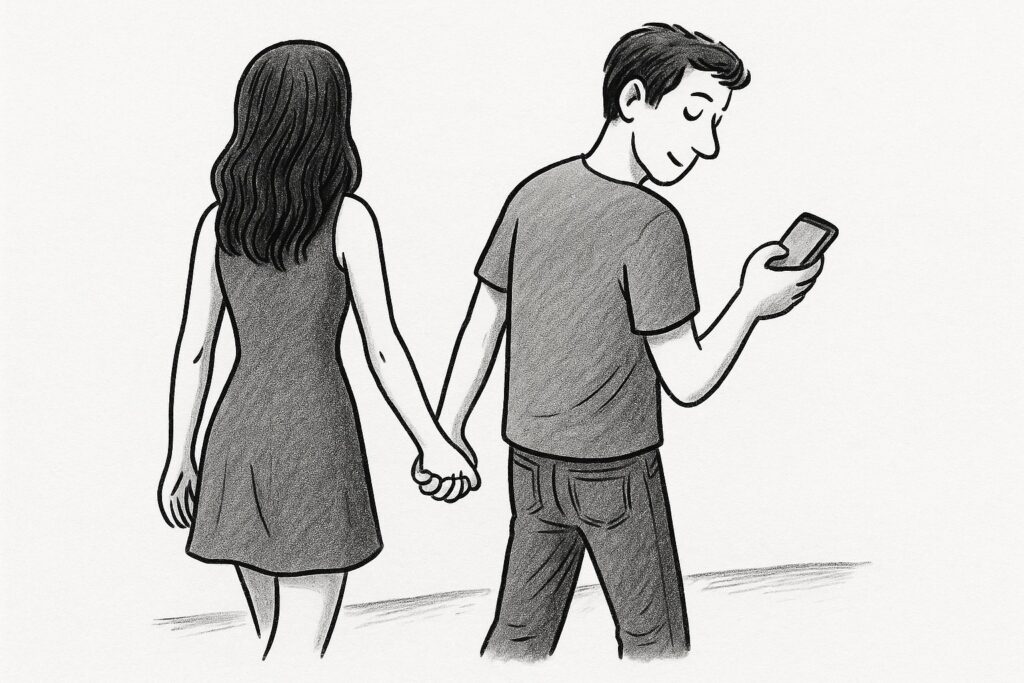Online dating isn’t a single interaction—it’s a layered and ongoing process. At any given moment, we find ourselves navigating multiple connections, each at a different stage. Some matches haven’t turned into conversations. Others have opened with a message and are now hanging in silence, waiting for someone to respond. Some conversations are flowing easily, some are dying out, and others sit in that familiar space of “not sure yet.”
Then come the in-person stages: someone you’re planning to meet for the first time, someone you just went on a first date with, someone you’ve now seen a few times. If things continue, the connection might move toward exclusivity or settle into something resembling a relationship.
Many of us—especially those who’ve spent any time on dating apps—juggle multiple threads like this at once. That fact alone opens up ethical questions about attention, honesty, and how we treat people when they’re half-real in our minds. But that’s a topic for another reflection. Here, I want to focus on a different issue: how we misjudge and misrank connections in this environment.
We try to decide who’s worth more of our time and emotion. And to do that, we rely on a messy tangle of criteria: looks, values, lifestyle compatibility, texting style, humour, intellect. But in this ranking process, there’s one factor we routinely forget: progress.
Imagine you’ve gone on a few solid dates with someone. You like them, even if it’s not a cinematic love story. Then, a new match appears. They’re more physically your type, or they seem to “get” you better, or they’re simply unknown—and that unknown feels exciting. Suddenly, your attention shifts. You find yourself cooling off toward the person you’ve been seeing, emotionally investing in a fantasy.

But the truth is, we don’t just misjudge potential—we often idealize it. The less we know about someone, the more room there is for projection. Mystery creates allure. We fill in the blanks with hope, imagining the best-case version of who they might be. And yet, from a rational standpoint, something known to be good—however imperfect—should rank higher than something unknown that could go either way. Still, many of us get that comparison wrong. Again and again.
We chase the imagined promise of the unknown—only to find it rarely delivers. Most of these new matches go nowhere. The drop-off rate at every step—match to chat, chat to date, date to something meaningful—is dismally low. That shiny new option may never even meet you—and if they do, they might vanish mid-conversation, pivot without warning, or ghost you just when you let your guard down. At best, they’ll tell you they’re not ready to date, or that they’ve met someone else.
It’s a kind of cognitive error. Like trading a working cow for what you’re told are magical beans—except in online dating, the beans almost never grow. In Jack and the Beanstalk, Jack gets lucky. You probably won’t.
A more grounded analogy might be this: you’re comparing a PhD student with an A– average to an undergrad with a perfect GPA. The undergrad might look better on paper. But the PhD student has already done the work. They’re further along the path. The undergrad may never apply. Comparing them without context is a mistake.
And so it is with dating. We often make decisions based on raw potential, without discounting for uncertainty or giving proper weight to how far a connection has come. We undervalue emotional momentum, shared experience, context, and trust. We chase what might be and dismiss what already is—until we’re left with neither.